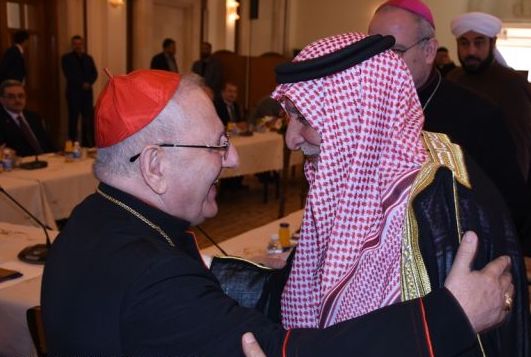Christians, Muslims and lay people in favour of Patriarch Sako’s candidacy for the Nobel Peace Prize
For Mar Sako, the candidacy helps “keep alive the focus on the Iraqi people, on the Christian community" and defeat "marginalisation and indifference" towards minorities. Muslim support for his nomination is "important" and represents a "sign of closeness", opening “the door to progress and democracy". For the archbishop of Kirkuk, this is a form of “recognition" for all Christians in Iraq and the Middle East.
Mar 08, 2018

BAGHDAD: Mar Louis Raphael Sako, the primate of the Iraqi Church, has been named for the 2018 Nobel Peace Prize.
For him receiving a prize "is not important", he told AsiaNews. What counts is "the symbolic value of the gesture" because it helps "keep alive the focus on the Iraqi people, on the Christian community", which is still today the victim of attacks. It also helps working "for the future of the country".
"In the recent meeting with Pope Francis, I asked him for moral and spiritual support,” the primate said. This “is what we need.”
Becoming a nominee for the prize “flow from this and represents an extraordinary contribution to overcoming marginalisation and indifference towards our suffering and that of other minorities."
In Iraq and around the world, religious leaders, intellectuals and civil society groups back the initiative, as way to acknowledge the Chaldean primate’s work in favour of peace, coexistence, and reconciliation, first as a bishop and today as patriarch.
This is an essential task in a nation that is still marked by violence, internal conflicts and sectarian divisions.
The Catholic association L'Œuvre d'Orient put forward his candidacy in late January, which the Norwegian Nobel Committee accepted.
The nomination is backed by a number of people, in Iraq and the world (especially in France, where the Patriarch Sako has developed strong ties of friendship and collaboration with Catholic and non-Catholic prelates and NGOs), including Christians and Muslims who praise his work in favour of peace and coexistence.
In particular, in the Muslim community, a united front has developed between Shias in Najaf (Iraq) and Sunni leaders in Jordan and Lebanon who have strongly supported his candidacy. This too is an additional sign of the work of the Church in Iraq, of its leaders, as a bridge with other religions.
"It's nice to see that even the Muslims have supported my candidacy,” Mar Sako said. “In fact, I would say that they have done it with greater vigour and this is even more important. It represents a sign of closeness and opens Iraq’s doors to progress and democracy."
Last week, the Chaldean patriarchate organised an inter-faith meeting that was "a great source of courage and hope. In the next few days I will go to Najaf to give a speech. This is not for me, but for all of Iraq and for the good of its people." Najaf is one the holiest cities in Shia Islam.
On 31 January 2013 the then archbishop of Kirkuk, Mgr Sako became the new Chaldean patriarch, succeeding Emmanuel Delly III who resigned due to age limitations. Born on 4 July 1948 in Zakho, northern Iraq, he was ordained a priest on 1 June 1974.
As a prelate, then as a primate of the Iraqi Church, he has repeatedly denounced the exodus of Christians from the country and made numerous pleas to the central government and local authorities, to guarantee them a peaceful future in their land of origin.
"Our hope is that this candidacy will run its course, and end in a positive outcome,” said Mgr Yousif Thoma Mirkis, the archbishop of Kirkuk.
This award, the prelate added, represents "a recognition not only for him personally, but for all the Christians of Iraq and the Middle East who, in the past few years, have fought hard, stood firm, and yet remained non-violent whilst seeking peace, human rights, coexistence and development in the country."
Giving the Nobel Peace Prize to Mar Sako would also be a way to remember "the martyrs of the Chaldean Church, people like Mgr Rahho and others, priests and lay people, who sacrificed their lives for their faith."
"For us Christians of the Middle East,” Mgr Mirkis said, “this would be an important and significant gesture, because it would highlight the sacrifices of an ancient community that chose to remain in its own land despite persecution, the latest being that of Daesh (Islamic State) which forced hundreds of thousands of families to flee, convert or be killed."
French Socialist Senator Bernard Cazeau echoes such sentiments. In his view, Patriarch Sako "embodies" the dialogue between faiths and is "respected" by Muslims, Yazidis, Sabeans, religious believers and atheists, for his "honesty, sincerity, simplicity, and generosity".
In France, he notes, the patriarch’s candidacy now has the support of 125 senators and 115 Members of the French National Assembly in recognition of his work for the marginalised and the victims of violence, and not just Christians.--Asia News







Total Comments:0